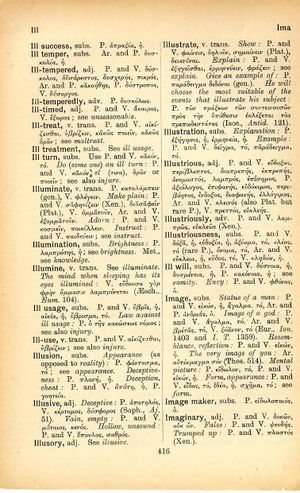illuminate: Difference between revisions
From LSJ
κοινὴ γὰρ ἡ τύχη καὶ τὸ μέλλον ἀόρατον → fortune is common to all, the future is unknown | fortune is common to all and the future unknown | fate is common to all and the future unknown
(Gf-D_4) |
(3_6) |
||
| Line 12: | Line 12: | ||
{{Gaffiot | {{Gaffiot | ||
|gf=<b>illūmĭnātē</b> <b>([[inl-]])</b>, avec l’éclat du style [emploi des figures] : Cic. de Or. 3, 53. | |gf=<b>illūmĭnātē</b> <b>([[inl-]])</b>, avec l’éclat du style [emploi des figures] : Cic. de Or. 3, 53. | ||
}} | |||
{{Georges | |||
|georg=illūminātē, Adv. ([[illumino]]), erleuchtet, [[lichtvoll]], dicere, Cic. de or. 3, 53. | |||
}} | }} | ||
Revision as of 09:25, 15 August 2017
English > Greek (Woodhouse)
v. trans.
P. καταλάμπειν (gen.), V. φλέγειν. Make plain: P. and V. σαφηνίζειν (Xen.), διασαφεῖν (Plat.), V. ὀμματοῦν, Ar. and V. ἐξομματοῦν. Adorn: P. and V. κοσμεῖν, ποικίλλειν. Instruct: P. and V. παιδεύειν; see instruct.
Latin > English (Lewis & Short)
illūmĭnātē: adv., v. illumino.
Latin > French (Gaffiot 2016)
illūmĭnātē (inl-), avec l’éclat du style [emploi des figures] : Cic. de Or. 3, 53.
Latin > German (Georges)
illūminātē, Adv. (illumino), erleuchtet, lichtvoll, dicere, Cic. de or. 3, 53.

